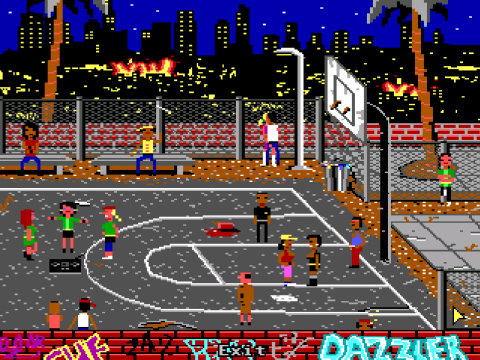A quick glance at Urban Witch Story and one might peg the game as a part of the Police Quest series. After all, it stars cops, uses an interface reminiscent of Sierra’s AGI adventures, and even takes place during the Los Angles riots of 1992, which ultimately led to controversial LAPD chief Daryl F. Gates retiring and becoming an advisor on Police Quest: Open Season, the fourth game in the franchise.
But Urban Witch Story wasn’t made by Sierra in the ‘90s – it was released in 2020 on itch.io and created by Spanish solo dev José María Meléndez, who makes games under the name Postmodern Adventures.
“Urban Witch Story was started when I first got to use the Adventure Game Studio engine,” Meléndez said in an interview. “I just wanted to see how it worked, and I needed some art. The quickest way to have it was to emulate the aesthetic of Sierra’s first adventures, back in the ‘80s with the AGI engine. The Police Quest series came to my mind, so I made a background for an LA suburb set in the ‘90s. Despite some design issues and the fact that those games are probably, nowadays, a frustrating experience for players, the truth is I like the series. Especially the VGA remake of the first game, which I consider is the most balanced. As I learned to use the engine, I thought to make a modern Police Quest, with no frustrating puzzles. Fair for players, but holding onto the AGI aesthetic both in visuals and sound.”
While Urban Witch Story might be influenced by Police Quest, the game quickly carves out original territory for itself. Players control a Black policeman named Officer John Barker who is tasked with investigating the disappearance of two South Central children on the first night of the LA riots. Accompanying him is his white partner, Officer Al Jackson, who plays the role of an older mentor but has a host of problems, including an ongoing separation from his wife and an inability to rely on others. The gameplay progresses like a traditional adventure as opposed to Police Quest’s obsession with following procedure, meaning that there’s no need to walk around your vehicle prior to driving to prevent an unforeseen road accident. Instead, Barker and Jackson interview civilians, travel to hotspots on a map and combine items in puzzles that require thought, but never feel as far-fetched as their Sierra counterparts. (For instance, blowing off a car lock in a discreet manner to avoid attracting attention requires muffling the gunshot with a pillow.)
The game features no deaths, which lets players focus on the story. And the writing, despite a few clunky translations from the original Spanish script, is Urban Witch Story’s strength. Both Barker and Jackson are a hundred times more interesting than the relatively bland Sonny Bonds of Police Quests 1-3, not to mention his even blander replacement John Carey in Police Quest: Open Season. Furthermore, by centering the story on a Black cop during one of the most tumultuous moments in Los Angeles history, Urban Witch Story tackles race relations on a far more intimate level than the Police Quest series, which veered from “mildly racist” to “full of Daryl F. Gates propaganda.” Rodney King – the Black man brutalized by LAPD officers who were initially acquitted – is mentioned at multiple intervals throughout Urban Witch Story, which features newscasters describing the ongoing protests and fires burning in the background of most screens. While Officers Barker and Jackson do not become intimately involved in the riots during their search, Urban Witch Story’s politically-charged setting remains a constant underlying force. For instance, the game opens with an old friend named Leroy greeting Barker with hostility for turning his back on his community, and the struggles that Barker feels as he grapples with his own thoughts on police brutality continue to bubble to the forefront of his characterization.
“The idea of setting the game in the ‘92 LA riots came up because I needed an excuse for the NPCs to be reluctant to cooperate with the pair of cops,” Meléndez said. “This is an adventure, after all. It needs puzzles; you need to work to get info. So I needed a setting where the main characters wouldn’t get what they wanted by just showing their badges. I remembered the Rodney King case and the LA riots. If there was a reason for the police to be even worse considered in South Central, where the game is set, it was the night the riots began. When I set my games in a particular time in an actual location, I try to be as close as possible to the real thing, so the world I create is the most realistic and alive as possible. So I familiarized myself deeply with that particular time. The game mentions which streets patrols were sent to, what Rodney King said during his TV appearance that night, the emotional condition of the population…[all] with the intention of taking advantage of the historical event, for the game to be as close to reality as possible.”
Aside from politics, Urban Witch Story contains a strong undercurrent of the supernatural, with both officers discovering that the missing children were fascinated by cryptids, UFOs and other unexplained phenomena. Their search takes them into the world of urban legends, with a definite shift occurring halfway through the narrative as the officers stumble upon a Supernatural Museum with a plethora of information on everything from the Mothman to the mysterious cast deaths associated with the 1982 film Poltergeist.
“The Supernatural Museum that you can visit in the game is inspired by a section of The Lost Crown, by Darkling Room,” Meléndez said. “I was fascinated by the idea of having a series of optional backgrounds you could roam without them being attached to the story advancement. By then, I thought Urban Witch Story was to be my first and last game, so I didn’t let the opportunity go and did something similar to that which had an impact on me. I consider myself a rational person, and I consider the supernatural world to be a mix of inventions and misinterpreted data. I would be lying if I said I’m not fascinated by it all, though. The fact that I mixed urban legends and brought a detective adventure closer to horror is due to me being a fan of the horror genre. I can write something realistic, but I think it’d be richer and more interesting if sprayed with horror and fantasy.”
This blend of supernatural horror interweaving with real-world racial horror makes Urban Witch Story stand out like few other free indie games. Postmodern Adventures’ accomplishment was celebrated in 2020 with a host of awards in the Adventure Game Studio community, including the Best Game Created With AGS, the Best Writing, Best Gameplay, Best Background Art and Best Music & Sound. Both Officer Jackson and Leroy also make cameos in Postmodern Adventures’ first commercial title, an ode to ‘80s slasher flicks named Nightmare Frames that was released in 2022. Meléndez believes that Urban Witch Story’s characters might return in the future, though a remake of the original game is unlikely.
“I think one of [Urban Witch Story’s] virtues is the feeling that you’re playing something old, but with a modern soul. As for sequels, I’d like to go back to the characters. But I’ve also got other stories to tell that are dear to me.”


